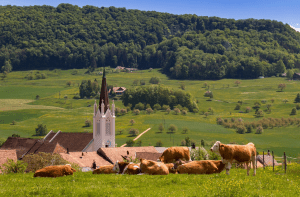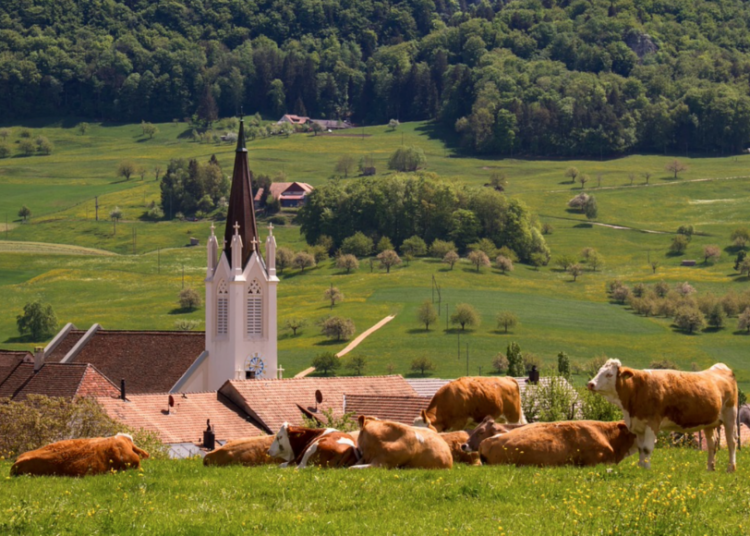 Whether Roman Catholic, Eastern Orthodox or orthodox Protestant, the Bible is the basic book of the Christian faith. One may well ask if it has anything to say about how we should live, not only about the fruits of salvation, but about what kind of government we are to have or what kind of economy? There are arguably some broad hints suggesting the Bible affirms limited government and free markets, certainly private property. To be quite specific, does it contain the principles, implicitly or explicitly, indicating we are to have an industrial political economy or an agrarian one? Or is it completely silent on the matter?
Whether Roman Catholic, Eastern Orthodox or orthodox Protestant, the Bible is the basic book of the Christian faith. One may well ask if it has anything to say about how we should live, not only about the fruits of salvation, but about what kind of government we are to have or what kind of economy? There are arguably some broad hints suggesting the Bible affirms limited government and free markets, certainly private property. To be quite specific, does it contain the principles, implicitly or explicitly, indicating we are to have an industrial political economy or an agrarian one? Or is it completely silent on the matter?
One is certainly tempted to argue for an agrarian society for the following, admittedly abbreviated, reasons. From Genesis to Revelation the Bible is filled with favorable references to gardens, parks, land and tilling the ground. Before sin, after sin, and in the promises of the future life, the picture of the good life is always agrarian. Every man will sit under his own vine and fig tree (1 Kings 4:25), a symbol of peace and prosperity to be sure but not to be dismissed as mere metaphor. The historical experience of the Israelites and their blessing and promises were agrarian. (Cf. Isa. 2:4) Also, the analogies and parables in the New Testament are overwhelmingly agrarian. Is all this to be ignored or dismissed as mere inessential matter?
Many would indeed dismiss these points as immaterial. Just as we don’t insist today the good life requires us to wear sandals and long robes, so why should we expect these agrarian themes to be other than historical and accidental? More bluntly, skeptics mean that such references were simply the historically conditioned circumstances of the time and even if essential to that time are not essential today and we are not to try to imitate that life-style even in some more distant sense of applying its “agrarian” principles.
Yet while it’s true the Bible is a book of eternal salvation, not of political economy, that doesn’t mean the other statements it makes are to be dismissed as immaterial. Christian philosopher Norman Geisler (Biblical Errancy, p.13) speaks to the issue on the matter of science when he writes: “Now certainly it is one thing to read modern scientific theory into ancient poetry, but it is another to exclude space-time affirmations from the book authored by the Creator of the physical universe.” One may say the same thing with regard to political economy. The Bible does make affirmative statements about ways of living, including political economy, just as it does about the natural world which are true and positive and have implications for Christian faith and practice.
The argument from historical relativism misses the point. Can we rightly separate the agrarian aspects from the spiritual ones? This can be answered in a way similar to Geisler’s argument (p. 21) about nature: “[Christians] cannot look at historical and scientific affirmations in Scripture as purely symbolical or mythical. In short we cannot separate science and Scripture…The scientific cannot be separated from the spiritual without doing violence to the spiritual.” In a parallel manner, we cannot take seriously thoughtless platitudes that dismiss anything we don’t like as “pre-modern,” “pre-scientific,” or “pre-capitalistic” and in this way pretend to separate the important spiritual from the outdated accidental material. That the Author of the Book knew all things in advance and still choose to write it this way should tell us something. Frankly, the agrarian references, illusions, parables, and promises are so intricate a part of Scripture, as essential to it as a book as they are themselves to human nature, that they cannot be dismissed as incidental, historical trivia.
The same Author of our being understands how our human nature is to be fulfilled: we need the proper balances between privacy and fellowship, town and country, the individual and the community. With the 200-year history of industrialization and urbanization, with agricultural, employment and health care difficulties along with tremendous social decay and collapse, we are justified in wondering whether these enduring human needs are not best met in an agrarian political economy after all. This is especially poignant when we compare our present economic system with the successful present-day agrarian societies like the highly profitable Amish farmers. A sound economy, of course, doesn’t have to have the detailed form of Israelite or Amish communities but it should retain the basic principles which include among other things that closeness to land, nature and creation necessary for a healthy relationship with Deity and a humane life. For nearly all of human history man has lived a primarily agrarian life. All civilizations are agrarian. No evidence exists that industrialization could produce a civilized society, though evidence from our recent experience indicates it can destroy one.
The issue is fundamental and general and not particular and idiosyncratic. It is not a matter of requiring people to wear sandals and robes but more like getting them to recognize the need for clothing or like recognizing that people are meant to live on land rather than at the bottom of the sea. Our political economy is rather like a form of “social clothing,” and should be a modest material adornment becoming a civilized, Christian people. An agrarian economy, which still has plenty of room for universities, banks, and small cities, would seem more suitable than the out-landish styles of an overly urbanized and commercialized society.
The Bible thus has been consistent with the basic pattern of historically-received political economy—until relatively recently. It is as if we had partaken of the forbidden fruit of modernism but our eyes still fail to see the spiritual and economic nakedness of our over-industrialized condition. Nor do we apparently have the decency to feel ashamed. Surely, it’s high time we reconsidered what a real Christian political economy should be.
This essay appeared in The Legacy of Wilhelm Roepke: Essays in Political Economy by Ralph Ancil. Copyright held by the Wilhelm Roepke Institute and reprinted by permission.
This essay was first published here in September 2012.
The Imaginative Conservative applies the principle of appreciation to the discussion of culture and politics as we approach dialogue with magnanimity rather than with mere civility. Will you help us remain a refreshing oasis in the increasingly contentious arena of modern discourse? Please consider donating now.
The featured image is courtesy of Pixabay.


